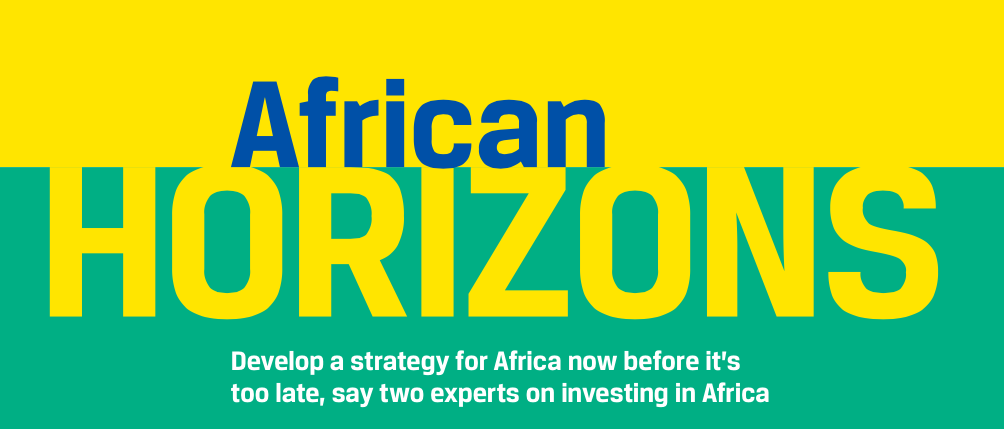Kuramo Featured in CFA Institute Magazine Interview: African Horizons
March 5, 2015
Wale Adeosun, CFA, participated in an interview with the CFA Institute discussing investment opportunities in Africa with Melissa Cook, CFA. Below are excerpts from the interview entitled, “African Horizons: Develop a strategy for Africa now before it’s too late, say two experts on investing in Africa”, written by Nathan Jaye, CFA:
An advisory council appointed by US Secretary of Commerce Penny Pritzker to expand business opportunities in Africa is now in full swing. The President’s Advisory Council on Doing Business in Africa (PAC-DBIA) includes two CFA charterholders with deep knowledge of Africa. Melissa Cook, CFA, is founder and managing director of African Sunrise Partners, a New York-based investment strategy firm focusing on Africa. Walé Adeosun, CFA, is founder and chief investment officer of Kuramo Capital Management in New York City, which provides investment management services to institutional investors focused on alternative assets in emerging and frontier markets. In this interview with CFA Institute Magazine, they discuss the challenges and opportunities of investing in Africa, the growing importance of Africa for investors and the companies in which they invest, and why “the opportunity cost of delaying is higher than it may seem.”
Why is PAC-DBIA happening now?
ADEOSUN: To encourage US businesses can participate in the growth of the African continent by investing in African companies that end up buying equipment from the US. While doing so, they’ll create new jobs in the US and also provide capital to African countries. The President started this initiative a couple of years ago, and there has been real commitment to the steps initially laid out. When the President went to Africa two years ago, I was invited to join the trip in Dakar and Johannesburg. The President mentioned that his treasury secretary and commerce secretary would be coming to Africa after him, and they did.
What will you recommend to the DBIA?
ADEOSUN: I want to help get large pools of US capital—I’m talking about big pension plans, endowments, and foundations—to understand that Africa provides a lot of opportunity for growth and they can participate in that growth by providing capital.
COOK: I believe that there is too little knowledge in the investment community about what’s really happening in Africa and what the opportunities actually are.
Why is Africa attractive now?
ADEOSUN: I don’t even think it’s so much resource based. I think it’s really consumer based. There’s an emerging middle class and a ton of people in the cities who have much more disposable income than we think they do. All of this is a result of the political stability that has occurred over the last 15 to 20 years as more governments in Africa have moved to a democratic form of government, which has improved the overall governance, including improved regulations and privatization of companies.
COOK: There are more than 700 million mobile phone users across the continent. When I tell my clients that—people who don’t know much about Africa—they can’t believe it. There’s so much power in this mobile phone base now. Even the most basic phones can transact mobile money. Governments can deliver services like tax collection, licensing, and voter registration via mobile phone. You have applications for edu- cation, health care, commerce, local informa- tion, and entertainment. The explosion of innovation that’s going on thanks to technology is nothing short of revolutionary.
What kind of return on investment are you looking for?
ADEOSUN: We’re looking to make returns similar to most frontier markets. In most of the investments that we make, which is mostly private equity, we’re looking to make three times our money back. I think that’s fair for investments in frontier markets.
What are the biggest risks of investing on the continent?
ADEOSUN: I’m not generally worried about political risks. If you invest in China, there is a concern your businesses could be nationalized in one day, given the regime. Africa tried that in the 1960s and 1970s with minimal success. I don’t think you have to worry about that in Africa, as most African countries have moved toward a democratic form of government. Nationaliz- ing business is not the way to go, and nobody’s practiced that, except for Robert Mugabe in Zim- babwe. I don’t see any other African countries doing anything like what Argentina just did. Africa is a lot about risk perception. One of the things President Obama is doing is lower- ing the risk perception in Africa and the asso- ciated risk premium. People should understand that this lowering of the risk perception isn’t very different from what has already happened in China, India, and Latin America. The risk premium should not be so high for Africa. It’s high right now because risk perception is high.
